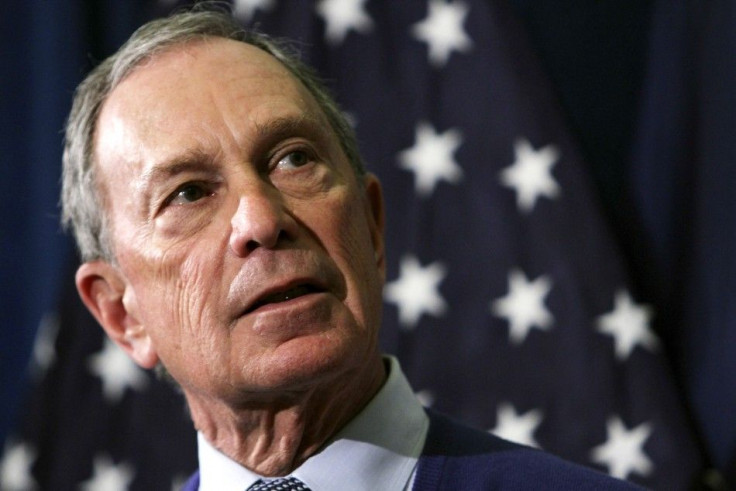NYC Mayor Bloomberg Plans Styrofoam Ban In State Of The City Address: Do Nanny Policies Work?

If New York City Mayor Michael Bloomberg gets his way again, Styrofoam containers may soon be like cigarette smoking in Central Park: gone.
Bloomberg, who is barred by law from seeking a fourth four-year term, is expected to use his final State of the City address to push for a citywide ban on all plastic foam food packaging that New Yorkers are so used to seeing with their morning coffee and takeout meals.
Bloomberg has already targeted trans fats, smoking and the sale of large sodas. These grand public health pushes have resulted in both praise and condemnation; some have blasted him for creating a “nanny” state.
But he isn’t the first mayor to try and fight Styrofoam. According to the New York Times, the late Ed Koch campaigned against it in 1987, encouraging fast-food restaurants to cut back on its use.
Bloomberg News, which was founded and is majority-owned by the mayor, reported that Bloomberg's final-year push will focus on more recycling and propose an increase in the number of parking spaces for electric cars.
“One product that is virtually impossible to recycle and never biodegrades is Styrofoam,” the news organization reported Bloomberg plans to say Thursday. “Something that we know is environmentally destructive and that may be hazardous to our health, that is costing taxpayers money and that we can easily do without and is something that should go the way of lead paint.”
Waste that is recycled has also fallen under Bloomberg's tenure from 23 percent in 2001 to 15 percent today, according to the Times. He will reportedly use Thursday's speech to call for a 30 percent recycling rate by 2017.
Last year, fast food giant McDonald’s announced it was conducting replacement tests to swap out Styrofoam for paper cups in 2,000 restaurants nationwide. Those tests came after nearly 30 percent of the chain’s investors said they wanted stronger environmental policies for the containers.
Bloomberg may just be able to succeed where Koch failed. Though his policies were much-protested, other states have adopted them.
Let’s take a look at the effectiveness of some the mayor’s contentious policies:
Smoking Ban In Restaurants, Bars
In 2002, New York City’s Smoke Free Air Act banned puffing in restaurants and bars. It was the largest individual city to have enacted such a policy. Bloomberg also found allies in the New York City Restaurant Association, which resisted the ban, while some of its members favored the policy.
Almost immediately the results were good. In just one year, a government review found a more than 80 percent decline in nicotine by-products in the air at those venues; the adult smoking rate dropped from 21.6 percent in 2002 to 18.4 percent in 2004. Nearly 40 states now have similar bans, with more than 3,000 municipalities placing restrictions on where to smoke.
Goodbye Trans Fats
Bloomberg fought against trans fats, a contributor to coronary heart disease, in 2006, and the ban went into full effect in 2008. The Annals of Internal Medicine reported that, in November 2008, the use of artificial trans fats for frying, baking or cooking dropped from 50 percent to less than 2 percent in NYC restaurants.
Other states and cities have since copied the ban and restrictions. Some research has found that cholesterol levels around the nation are falling. According to the Centers for Disease Control and Prevention, the overall decrease in trans–fatty acids was 58 percent in white adults in the U.S.
Salt Reduction Initiative
NYC’s National Salt Reduction Initiative started in 2009, targeting 62 categories of packaged food and 25 restaurant foods. The goal of this initiative is to cut sodium by 25 percent and reduce the national intake by 20 percent by next year. If successful, the New England Journal of Medicine found that reducing salt by 3 grams per day could prevent up to 120,000 new cases of coronary heart disease and save up to $24 billion in health care costs annually.
Don't Supersize Me
May last year, Bloomberg proposed a ban on the sale of sodas larger than 16 ounces at restaurants and concession stands. The NYC Board of Health approved it last September. However, the American Beverage Association has argued that the ban is unfair to small businesses and asked that a judge strike it down. The soda ban takes effect March 12.
Bloomberg has said the ban is meant to help curb the rate of obesity caused by sugary beverages. He said the city spends approximately $4 billion a year on medical care for people who are overweight. Some 58 percent of adults in NYC are considered overweight or obese. The jury is still out on this one.
© Copyright IBTimes 2024. All rights reserved.












